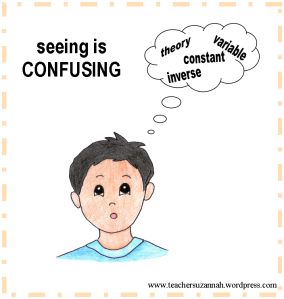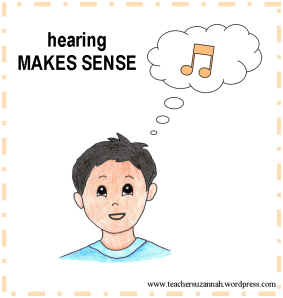“Won’t you just KEEP QUIET for awhile?”
Auditory learners hear that a lot! Being a dominantly auditory learner myself, I tend to see the world from that viewpoint, and empathize with those who learn like me. For those who are not, let me see if I can give you our side of the story…
Right now, in my classroom, I have two very chatty kindergarteners. They are both dominantly auditory, though one has a good mix of kinaesthetic and visual strengths as well. Teaching them constantly makes me more aware of the characteristics of auditory learners, our strengths and yes, our weaknesses. I’ll be honest; I’ll tell you everything. Here we go!
SPEAK! I AM LISTENING
 We auditory learners have great listening skills. As we listen, we are able to mentally put two and two together and cement the facts in our long-term memory. One common difficulty among us is that it is hard for us to learn by silent reading. In my high school days, we were assigned a great deal of reading (especially in physics, oh my!). Twenty pages a night was a common occurrence. I couldn’t do it. Nothing would go in! So, I learned to adapt to it and learn my way: I still would read the assignment, never mind that the words were just black marks on white paper; but I would wait till the next day to really understand. Once I was in class listening to the teacher explain the material, everything would fall into place. If not for my teacher, school would have been dreadfully difficult!
We auditory learners have great listening skills. As we listen, we are able to mentally put two and two together and cement the facts in our long-term memory. One common difficulty among us is that it is hard for us to learn by silent reading. In my high school days, we were assigned a great deal of reading (especially in physics, oh my!). Twenty pages a night was a common occurrence. I couldn’t do it. Nothing would go in! So, I learned to adapt to it and learn my way: I still would read the assignment, never mind that the words were just black marks on white paper; but I would wait till the next day to really understand. Once I was in class listening to the teacher explain the material, everything would fall into place. If not for my teacher, school would have been dreadfully difficult!
NOW LET ME TELL IT
That was not the only learning strategy I picked up to counteract my visual weakness. I found out that if I could take a very tangled concept and teach it to someone, I would understand it perfectly. Strange, isn’t it? My forbearing sisters put up with me for the last four years of high school, as I preached trigonometric functions and Planck’s constant to them during our homework time each afternoon. Perhaps they didn’t get much out of it, but I certainly did! Up till today, as I study Piaget’s theory of development and Vygotsky’s speeches, I have only to talk the concept over aloud to be able to understand the otherwise muddling jargon.
I CAN HEAR IT IN MY HEAD
You may notice that your auditory learner can remember well what he hears, whether it be instructions, poetry or speeches, but not what he sees. Auditory learners have a keen memory for what they hear, and can retrieve and “play” it back over in their heads. I love learning languages. When I’m trying to pick up a new language, I learned early on (it was through my debut with Pimsleur’s language series) that I can remember what I HEAR but not what I READ. Recently, I have been listening to an audio recording in a foreign language. After each listening, snatches of the discussion come back to me in the exact intonation used by the speaker. That is how I pick up language: hearing it “in person” and then hearing it over and over again in my head. After a few days, it sticks in my long-term memory and becomes part of my vocabulary. The same thing goes for music and poetry. It usually is the rhythm, tune and intonation that trigger my memory of the words.
 So, how might you use this strength to help your auditory learner? Put things into a sing-song rhythm, poem, or song that he can say with you or to himself. He’ll learn it quickly; and better yet, it will come back to him even outside the classroom. Auditory learners love poetry and songs. You’ll find him singing the state of being verbs, the preposition list, or whatever else you taught him… just for the sake of singing. I learned the rules for quotation marks to the tune of “Jingle Bells” in Sixth Grade (Primary 6); they have never left me since!
So, how might you use this strength to help your auditory learner? Put things into a sing-song rhythm, poem, or song that he can say with you or to himself. He’ll learn it quickly; and better yet, it will come back to him even outside the classroom. Auditory learners love poetry and songs. You’ll find him singing the state of being verbs, the preposition list, or whatever else you taught him… just for the sake of singing. I learned the rules for quotation marks to the tune of “Jingle Bells” in Sixth Grade (Primary 6); they have never left me since!
Incidentally, when I tried to teach one of my visual learner students the same song, I was terribly disappointed. He hated singing it and didn’t learn it well besides! It just drove home the point to me: they’ll learn best when you capitalize on their strengths.
All the best to you as you put up with your chatty auditory learners (yes, we do love to talk!), and do your best to help them!
Coming up next: Kinaesthetic Learners: Let Me DO It!
By the way, if you missed the first two of this series, you can find them in the Learning Category. If you’d like updates sent right to your email, do sign up for my newsletters (see the sidebar at the right). They’re available to you totally free!
Pingback: IMPLICATIONS: So What Does the Learning Style Mean? | Teacher Suzannah
Pingback: Learning Styles and What to Do about Them | Teacher Suzannah